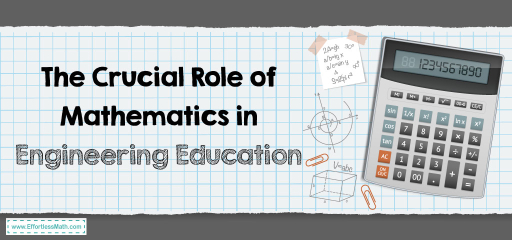The Crucial Role of Mathematics in Engineering Education

Mathematics is incredibly important for engineers! They use it every day to solve problems and create new designs. From building bridges to designing computer programs, math helps make everything work. In this article, we will explore how engineers use maths, why it’s important, and some interesting examples of mathematics in action. This information comes from experienced online math tutors at My Engineering Buddy (MEB), a trusted source for math and engineering online tutoring and homework help.
Is Math a Prerequisite for Admission to Undergraduate Engineering Programs Globally?
Yes! Engineering heavily relies on mathematical concepts, from basic algebra and trigonometry to advanced calculus and differential equations. These mathematical skills are essential for understanding and applying engineering principles.
Core Math Courses in Engineering Undergraduate Programs
In an average engineering undergraduate program, students typically complete between 4 to 6 core mathematics courses. The specific requirements can vary based on the engineering discipline and the institution. Some key courses are:
- Calculus I, II, and III – covering topics from basic calculus to multivariable calculus.
- Differential Equations – focusing on the behavior of dynamic systems.
- Linear Algebra – dealing with vector spaces and linear mappings.
Institutions like MIT and Caltech include these foundational math courses in their engineering curricula. Additionally, some programs may also require courses in statistics or discrete mathematics, depending on the engineering focus[1] (MIT Undergraduate Program).
Why Math is Important for Engineers
When you study to become an engineer, you spend a lot of time learning math. Subjects like algebra, geometry, and calculus are essential because they help you understand and solve engineering problems. Here’s why math is so important for engineers:
- Solving Problems: Engineers use math to find solutions to all kinds of problems. Whether it’s making sure a bridge is strong enough or designing a new car engine, math is the key.
- Making Predictions: Math helps engineers guess how things will behave. For example, they can use math to figure out how a building will react in an earthquake.
- Designing Things: Math is essential for designing everything from smartphones to space rockets. Engineers use math to make sure their designs work correctly.

How Engineers Use Math
Here are some ways engineers use math in their work:
- Predictive Analysis: Engineers use math to predict how things will behave under different conditions. This helps them design systems without having to build and test them first.
- Optimization: Math helps engineers find the best solutions. For example, they can use math to design a car that uses less fuel.
- Risk Assessment: Engineers use math to understand and manage risks. This is important in fields like finance and environmental engineering.
- Decision Support: Math helps engineers make better decisions. They can use math to choose the best materials for a project or figure out the most efficient way to build something.
- Modeling and Designing Systems: Engineers use math to create models of systems, like a new airplane or a power grid. This helps them analyze and improve their designs.
- Understanding Materials: Math helps engineers understand how different materials behave. This is important for designing buildings, bridges, and other structures.
Cool Math Problems in Engineering
Let’s look at some cool examples of how engineers use math:
- The Ladder Problem: Imagine a ladder leaning against a wall. Engineers use math to figure out the best angle for the ladder so it doesn’t slip. They calculate the forces acting on the ladder to make sure it’s safe to use.
- Logic Problems: In computer engineering, logic problems are solved using Boolean algebra. This helps engineers design circuits and systems that perform specific functions, like the ones in your smartphone or computer.
How Math and Physics Work Together
Math and physics are like best friends in engineering. They work together to help engineers design and build amazing things. For example, math helps engineers understand the forces acting on a bridge or how a car’s engine works. Engineers use mathematical models to predict how things will behave, making sure everything works as it should.
Math in Different Types of Engineering
Let’s see how math is used in different engineering fields:
- Mechanical Engineering: Math helps mechanical engineers analyze forces, understand motion, and design machines. They use concepts like fluid dynamics and thermodynamics to create engines and other devices.
- Electrical Engineering: Math is crucial for designing electrical circuits, control systems, and communication systems. Engineers use math to understand signals and create efficient, reliable circuits.
- Civil Engineering: Math helps civil engineers design and build infrastructure like roads, bridges, and buildings. They use geometry and calculus to make sure their designs are safe and strong.
- Chemical Engineering: Math helps chemical engineers model chemical reactions and design reactors. They use math to ensure processes are safe and efficient.
- Software Engineering: Math is used to develop algorithms, analyze data, and ensure system security. Engineers use discrete math, graph theory, and probability to create efficient and secure software.
Preparing for Math in Engineering
If you are preparing for an engineering degree, here are some tips to help you get ready for the math you’ll encounter:
- Build a Strong Foundation: Make sure you have a good grasp of high school math, including algebra, geometry, and trigonometry. These subjects are the building blocks for more advanced topics you’ll study later.
- Practice Regularly: Math is a subject that requires regular practice. Solve a variety of problems to improve your skills and understanding.
- Take Advanced Courses: If possible, take advanced math courses like calculus and statistics before starting your engineering program. This will give you a head start.
- Use Online Resources: There are many online resources available, including video tutorials, practice problems, and forums where you can ask questions. Websites like Khan Academy and Coursera offer free courses on various math topics.
- Seek Help When Needed: If you’re struggling with a particular topic, don’t hesitate to seek help. Online tutoring services like My Engineering Buddy can provide personalized assistance to help you overcome any challenges.

Correlation Between Math Skills and Engineering Success[2]
Here are some key findings regarding the correlation between strong math skills in school students and their success in engineering programs:
- Correlation Between Math Skills and Engineering Success: A solid foundation in mathematics is critical for success in engineering. Studies have demonstrated that high school students with better math grades are more likely to enroll in STEM (Science, Technology, Engineering, and Mathematics) programs and persist through to graduation.
- Math as a Predictor of STEM Enrollment: Mathematics grades in high school, particularly in the 12th grade, are strong predictors of enrollment in STEM fields, including engineering. Students with higher math self-efficacy and better math grades are more likely to choose and succeed in these programs.
- Impact on Academic Performance: Engineering students with strong math skills are better equipped to handle the rigorous quantitative and analytical demands of their courses.
- Math and Problem-Solving Skills: Mathematics education fosters critical thinking and problem-solving abilities, which are crucial for engineering.
Additional facts include:
- Problem-Solving and Logical Thinking
- Analytical and Precision Skills
- Modeling and Simulation
- Performance in Advanced Courses
- Data Analysis and Decision Making
- Success Rates in Engineering Programs
Conclusion
Mathematics is the backbone of engineering education. It provides the tools and frameworks engineers need to solve complex problems, design innovative solutions, and ensure the safety and efficiency of their projects. By understanding the importance of math and preparing effectively, aspiring engineers can set themselves up for success in their academic and professional careers. Whether you’re just starting your engineering journey or looking to strengthen your math skills, resources like My Engineering Buddy (MEB) are here to support you every step of the way.
References
- Massachusetts Institute of Technology (MIT) Department of Mathematics. MIT Undergraduate Mathematics Program.
- Eric Educational Resources. Study on Math Skills and STEM Success.
Related to This Article
More math articles
- Managing Math Fear as an Adult
- Fractional Forecasts: How to Estimate Sums and Differences Using Benchmarks
- Finding the Area Between Two Triangles
- Full-Length PSAT 10 Math Practice Test-Answers and Explanations
- 5th Grade RISE Math Worksheets: FREE & Printable
- 3rd Grade FSA Math Worksheets: FREE & Printable
- Top 10 Algebra 2 Textbooks in 2024 (Expert Recommendations)
- Top 10 Free Websites for TABE Math Preparation
- 5 Best Laptops for Math Teachers in 2023
- Algebra Puzzle – Challenge 38






















What people say about "The Crucial Role of Mathematics in Engineering Education - Effortless Math: We Help Students Learn to LOVE Mathematics"?
No one replied yet.